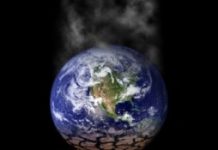“Substantial damage on US lives.”
That is according to the US National Climate Assessment released Friday, adding “impacts of climate change are intensifying across the country,” and “climate-related threats to Americans’ physical, social, and economic wellbeing are rising.”
The second volume of the congressionally mandated quadrennial report goes on to state:
“Climate change is loading the dice against us, it’s going to affect our water, food and ecosystems. This report is important because it shows it’s already happening where we live, not on far-off islands or at the poles.”
The dozens of draft report chapters break down how much man-made climate change is already not only affecting the environment in the United States but also the economy.
For example, fisheries, tourism, human health, and public safety are being “transformed, degraded or lost due in part to climate change impacts, particularly sea level rise and higher numbers of extreme weather events.”
Climate change costs could climb into the billions annually.
According to CNN:
“The Southeast alone will probably lose over a half a billion labor hours by 2100 due to extreme heat…Farmers will face extremely tough times. The quality and quantity of their crops will decline across the country due to higher temperatures, drought and flooding. In parts of the Midwest, farms will be able to produce less than 75% of the corn they produce today, and the southern part of the region could lose more than 25% of its soybean yield…Heat stress could cause average dairy production to fall between 0.60% and 1.35% over the next 12 years–having already cost the industry $1.2 billion from heat stress in 2010.”
In all but three years from 2000 to 2016, wildfires have devoured at least 3.7 million acres. More than 100 million people live in locales experiencing poor air quality, and groundwater supplies have rapidly decreased since 2001.
If we fail to enact the immediate, radical action necessary to prevent the atmosphere from warming more than 1.5 degrees Celsius–-2.7 degrees Fahrenheit-–over pre-industrial levels, further effects are, according to Michael Oppenheimer, climate scientist at Princeton University, “indescribable.”
Oppenheimer said:
“It would turn the world upside down in terms of its climate. There would be nothing like it in the history of civilization.”
We could be looking at acidic oceans dissolving coral reefs, cities like Manhattan and Miami inundated, extreme and persistent heat waves, food shortages, threats to governments’ stability, more frequent and larger wildfires, growing risks to property and life, mounting air pollution levels, increases in diseases, hunger, and mass migrations.
In terms of health:
“The Midwest alone, which is predicted to have the largest increase in extreme temperature, will see an additional 2,000 premature deaths per year by 2090.”
Zika virus, dengue fever, chikungunya, and West Nile cases are expected to more than double by 2050.
More disturbing news: we are not even close to enacting the necessary immediate steps.
The draft report warns:
“Neither global efforts to mitigate the causes of climate change nor regional efforts to adapt to the impacts currently approach the scales needed to avoid substantial damages to the US economy, environment, and human health and well-being over the coming decades.”
We have already seen the devastation caused from the historic and deadly Camp and Woolsey fires that have destroyed more than 100,000 acres and taken at least 77 lives.
After a major Nor’easter dumped a foot of early snow on parts of the Northeast last week, many spent Thanksgiving ensconced in a historic Arctic freeze.
A World Meteorological Organization report states carbon dioxide, methane, and nitrous oxide concentrations are far above pre-industrial levels, the highest “in the modern atmospheric measurement record and in ice core records dating back as far as 800,000 years,” with no indication of reversal in sight.
Many scientists theorize the world has begun a sixth mass extinction.
A major World Wildlife Federation (WWF) report involving 59 scientists from around the globe confirms humanity has eliminated 60% of mammals, birds, fish and reptile populations since 1970.
According to the latest data from the United Nations, man-made climate change already poses a serious threat to crops and global health. With a 4°C temperature increase, climate change could reduce nearly one-third of global crop production.
The White House has decided there is no need to try to mitigate further climate change since the planet’s fate is already sealed.
And since its fate is sealed, the Trump administration has decided to go all out and freeze Obama-era federal fuel-efficiency standards for cars and light trucks manufactured after 2020.
So, all hope is lost, right?
The US National Climate Assessment suggests if the United States immediately reduced its fossil fuel use and greenhouse gas emissions, it could save thousands of lives and generate billions of dollars.
Robert Bullard, an environmental scientist at Texas Southern University, argues:
“If we’re going to run this country like a business, it’s time to address climate as the threat multiplier we know it is before more lives are lost.”
Beverly Wright, founding director of the Deep South Center for Environmental Justice and a professor at Dillard University, adds:
“The findings in the Trump administration’s NCA report show how the health and daily lives of Americans are becoming more and more interrupted because of climate change. We challenge the administration to finally begin using this information to rebuild and strengthen the communities in the direct path of the atrocities wrought by the fossil fuel industry and decades of poor policies that have neglected our concerns. The science is undeniable, let’s fix it.”
At the United Nations (UN) general assembly in New York in September, the Marshall Islands announced a plan to reach net zero emissions by 2050.
The island nation’s president, Hilda Heine, stated:
“Every country must increase the ambition of their existing targets. If we can do it, so can everyone else.”
Last month, Hurricane Michael wrecked havoc on the South only two days after the Intergovernmental Panel on Climate Change (IPCC) released an alarming report stating the world has 12 years to halt coal consumption and slash carbon dioxide emissions.
But according to Michael Mann, esteemed Pennsylvania State University professor and director of the Earth Science Systems Science Center, the IPCC’s assessment is actually conservative, underestimating the amount of warming that has already occurred.
We actually have less carbon left to burn if we wish to avoid the 1.5 degree Celsius threshold the IPCC report cites.
We literally have no more time to waste on this.
It really does mean the future of the planet, and possibly all life on Earth.
Image credit: Pixabay




